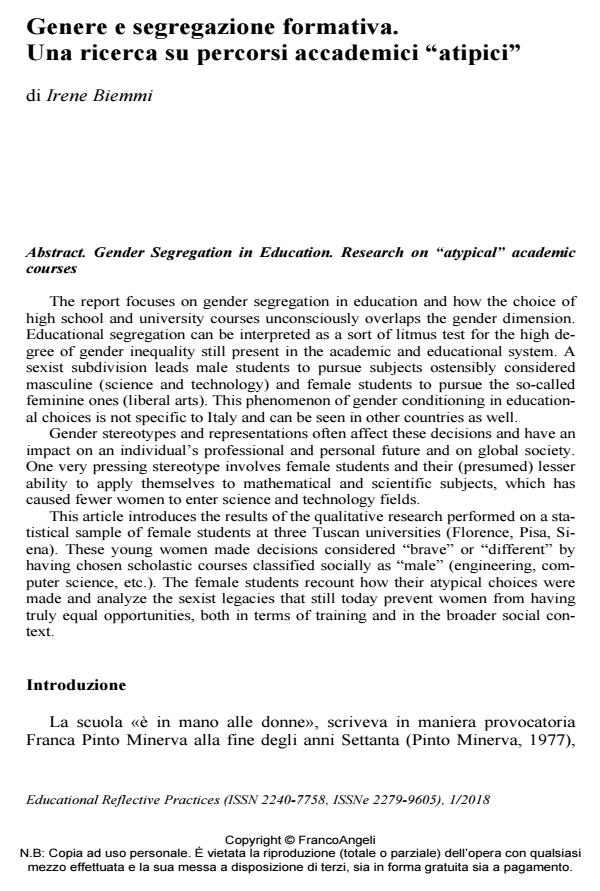Genere e segregazione formativa. Una ricerca su percorsi accademici "atipici"
Titolo Rivista EDUCATIONAL REFLECTIVE PRACTICES
Autori/Curatori Irene Biemmi
Anno di pubblicazione 2018 Fascicolo 2018/1
Lingua Italiano Numero pagine 19 P. 198-216 Dimensione file 222 KB
DOI 10.3280/ERP2018-001012
Il DOI è il codice a barre della proprietà intellettuale: per saperne di più
clicca qui
Qui sotto puoi vedere in anteprima la prima pagina di questo articolo.
Se questo articolo ti interessa, lo puoi acquistare (e scaricare in formato pdf) seguendo le facili indicazioni per acquistare il download credit. Acquista Download Credits per scaricare questo Articolo in formato PDF

FrancoAngeli è membro della Publishers International Linking Association, Inc (PILA), associazione indipendente e non profit per facilitare (attraverso i servizi tecnologici implementati da CrossRef.org) l’accesso degli studiosi ai contenuti digitali nelle pubblicazioni professionali e scientifiche.
The report focuses on gender segregation in education and how the choice of high school and university courses unconsciously overlaps the gender dimension. Educational segregation can be interpreted as a sort of litmus test for the high de-gree of gender inequality still present in the academic and educational system. A sexist subdivision leads male students to pursue subjects ostensibly considered masculine (science and technology) and female students to pursue the so-called feminine ones (liberal arts). This phenomenon of gender conditioning in education-al choices is not specific to Italy and can be seen in other countries as well. Gender stereotypes and representations often affect these decisions and have an impact on an individual’s professional and personal future and on global society. One very pressing stereotype involves female students and their (presumed) lesser ability to apply themselves to mathematical and scientific subjects, which has caused fewer women to enter science and technology fields. This article introduces the results of the qualitative research performed on a statistical sample of female students at three Tuscan universities (Florence, Pisa, Siena). These young women made decisions considered "brave" or "different" by having chosen scholastic courses classified socially as "male" (engineering, com-puter science, etc.). The female students recount how their atypical choices were made and analyze the sexist legacies that still today prevent women from having truly equal opportunities, both in terms of training and in the broader social con-text.
Irene Biemmi, Genere e segregazione formativa. Una ricerca su percorsi accademici "atipici" in "EDUCATIONAL REFLECTIVE PRACTICES" 1/2018, pp 198-216, DOI: 10.3280/ERP2018-001012